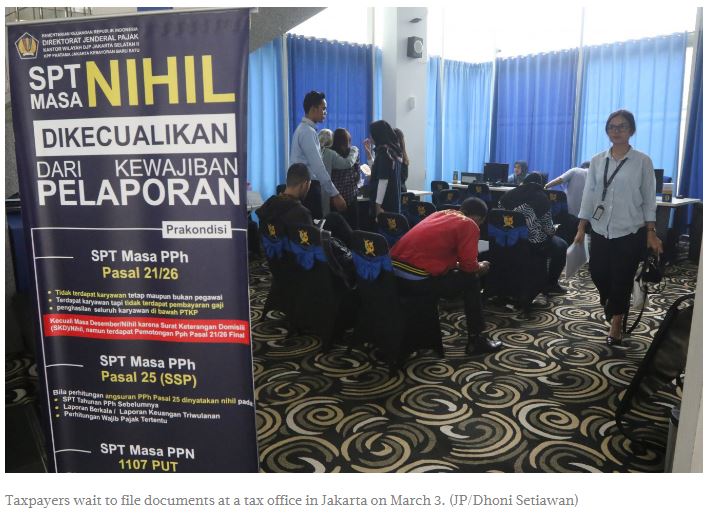Indonesia needs broad-based tax reform to boost state revenue: IMF
Indonesia needs broad-based tax reform to boost its revenue in the long run so that the country can minimize the impact of spending adjustments and fund its development projects, the International Monetary Fund (IMF) has said.
Although the country has established a digital tax as a new income source, the additional revenue is likely to be limited during the next few years because digital transactions remain small, said IMF mission chief for Indonesia Thomas Helbling.
“It is unlikely to offset the loss in corporate income tax from the reduction in tax rates,” he told The Jakarta Post on Wednesday.
The government has cut corporate income tax from 25 percent to 22 percent this year and will cut it further to 20 percent in 2022. The cuts apply to almost all business sectors and are part of an effort to keep the private sector afloat during the pandemic.
The government has implemented the digital tax policy, which enables it to levy a value added tax (VAT) on taxable intangible goods or services sold by global technology companies and charge income tax or electronic transaction tax on e-commerce outlets operated by foreign individuals or digital companies that have a significant economic presence. The threshold of a “significant economic presence” is determined through a company’s gross circulated product, sales and active users in Indonesia.
“While bringing corporate tax rates closer to neighboring countries can help maintain Indonesia’s attractiveness, taxes are only one factor,” Helbling said. “In fact, Indonesia urgently needs broad-based tax reform that boosts the resources available to the government.”
Implementing a medium-term revenue strategy that aimed to raise 5 percent of gross domestic product (GDP) in additional revenue would help the country going forward, he added.
“It would reduce the burden on expenditure adjustment, which would minimize the drag on growth from the planned fiscal consolidation and thereby create fiscal space for high priority development spending such as education and infrastructure,” he said, adding that the latter would support the country’s competitiveness and economic growth.
Indonesia is planning fiscal consolidation through policies aimed to reduce the deficit and national debt once the COVID-19-induced economic downturn subsides. It aims to bring the budget deficit back below 3 percent by 2023 as the coronavirus pandemic response is expected to widen the deficit to 6.34 percent of GDP in 2020 and 5.7 percent of GDP in 2021.
The health crisis has spurred government spending, sapped tax revenue and necessitated government borrowing as the government has earmarked Rp 695.2 trillion (US$47.45 billion) for an economic stimulus package.
The government had collected Rp 1.15 quadrillion in state revenue as of September, a decrease of 13.7 percent year-on-year (yoy), as tax revenue fell by 16.9 percent yoy to Rp 750.6 trillion due to a sharp fall in import taxes and the cut in corporate income tax.
The budget deficit is expected to raise the debt-to-GDP ratio to 38.5 percent this year, up significantly from about 30 percent last year, according to a government projection.
Tax officials did not respond to the Post’s request for comment on Wednesday.
“A credible medium-term fiscal strategy, including steps to improve revenue mobilization and spending efficiency, is needed given high debt levels and limited tax bases [in the region],” the IMF said in its October edition of the Regional Economic Outlook for Asia and the Pacific, published on Wednesday.
Policy support must be sustained and aimed at the most vulnerable where fiscal multipliers are the highest, the fund added.
“Fiscal support measures not only mitigate the economic cost of the pandemic but can significantly reduce the number of infections,” the IMF said. “By helping to protect the livelihoods of consumers and workers and increasing their disposable income, these measures make staying home more affordable and help reinforce greater social distancing.”
The IMF expects Indonesia’s economy to contract by 1.5 percent this year as the country struggles to contain the COVID-19 outbreak. It predicts the economy will rebound by 6.1 percent in 2021 driven by economic reopening and policy support.
As the country approaches its first economic recession since the 1998 Asian financial crisis, the government should not intensify tax collection efforts from existing taxpayers to avoid pushing them further amid cooling business activity, said Center for Indonesia Taxation Analysis (CITA) deputy director Ruben Hutabarat on Wednesday.
“Instead, the government should maintain its focus on the national economic recovery efforts, which have become the priority of its fiscal policy,” he wrote in a text message. “Law No. 2/2020 has given the government room to widen its budget deficit to beyond 3 percent so that its countercyclical policy can rely on funding sourced from debt [instead of tax collection].”
Source: https://www.thejakartapost.com/news/2020/10/22/indonesia-needs-broad-based-tax-reform-to-boost-state-revenue-imf.html


 English
English




